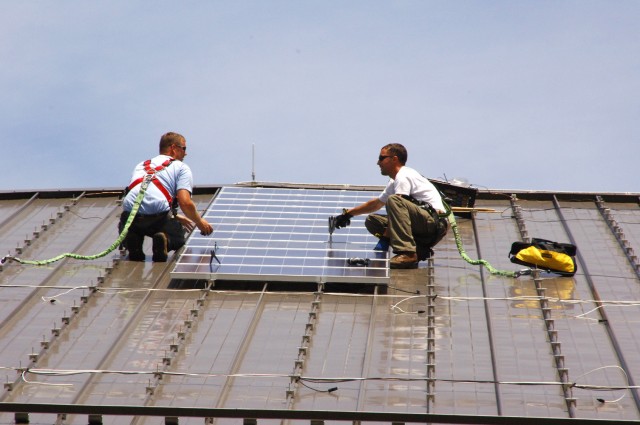Fort Dix, N.J. (U.S. Army Environmental Command, Sept. 4, 2009) -- Officials unveiled a new solar-panel array atop the 99th Regional Support Command Headquarters during a ribbon-cutting ceremony on Fort Dix, N.J., Sept. 3.
The 1,204 solar photovoltaic panels atop the building will produce an estimated 310,000 kilowatt-hours of energy per year while eliminating 2,177 tons of airborne toxins and saving more than $160,000 annually.
This financial savings can, in part, be invested in the nation's Citizen-Soldiers, according to Maj. Gen. William Monk III, commanding general, 99th Regional Support Command (RSC).
"As we continue to meet the Army's needs for relevant, ready forces to fight the long war, the money that the Army Reserve saves here can be used instead to provide the equipment and other resources needed to ensure its Soldiers are trained and equipped to the highest standards," Monk said.
These solar installations are part of a $17.6-million program that will decrease energy consumption on Fort Dix by almost 10 percent and water use by more than five percent. The post will finance the program through energy and operational savings guaranteed by contractor Honeywell International under a performance contract with the Army spanning the next 23 years.
"Fort Dix has always excelled at any mission it has ever been assigned," said Col. Patrick J. Slowey, installation commander, "and today's mission of employing renewable energy sources, reducing our dependence on fossil fuels and helping to preserve our environment is no different."
Moving toward renewable energy sources such as solar power - and away from non-renewable sources such as fossil fuels - offers several benefits, according to U.S. Rep. John Adler, 3rd District, N.J. "Today is a small but significant victory for America's national security," Adler said, explaining that over-reliance on foreign-produced fuel sources limits U.S. negotiators in matters of foreign policy.
"It's also a great victory for our national economy," he added, noting that the New Jersey based Honeywell International installed the 99th RSC HQ solar array, along with a similar array at a controlled-humidity warehouse on Fort Dix.
These projects are the first of several energy upgrades planned by Fort Dix and Honeywell that include boiler controllers, replacement of current heating and air conditioning systems, replacement of current lighting with energy efficient ballasts and lamps, water reuse for golf course irrigation, and an energy monitoring control system.
"Working with the leaders and energy experts at Fort Dix, we identified the retrofits and renewable energy source that would help the post meet its efficiency and climate targets, and provide the greatest return on investment," explained Kevin Madden, vice president, Honeywell Global Sales.
"The return on investment will be good for the taxpayer," said Jean M. Fox, president, New Jersey Board of Utilities. "We're proud to highlight projects like the Fort Dix project. It's a role model for other facilities."
This information is provided by the <a href="http://www.aec.army.mil">U.S. Army Environmental Command</a>. USAEC is the Army's point organization for supporting the implementation of environmental programs that facilitate sustainable Army training and operations while protecting the environment. We provide environmental program management and technical support products and services in support of Army training operations, acquisition and sound stewardship.
<center>"Sustaining the Environment for a Secure Future"</center>




Social Sharing